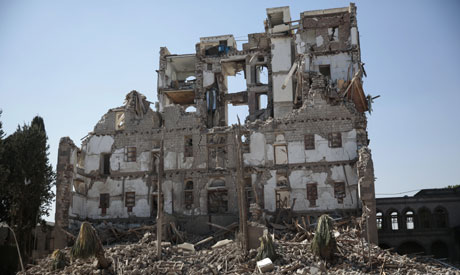
The Republican Palace that was damaged by Saudi-led airstrikes lies in ruins, in Sanaa, Yemen, Wednesday, Dec. 06, 2017 (Photo: AFP)
Current events in Yemen are forcing a change in the regional arena, most apparent in transformations made by the Saudi-led Arab Coalition on Yemen. Before his assassination Monday, former Yemeni president Ali Abdullah Saleh had broken his association with the Houthis and returned to his former allies, turning a new page with neighbouring countries.
Saleh’s move was welcomed in the media and amid political circles that are now relieved the Houthis no longer enjoy any kind of support in the country, especially with rising popular resentment against the rebels. Moreover, military strikes are being directed at Houthi strongholds in the capital Sanaa.
After Saleh had shifted his alliance, Ahmed Rafik, who is close to leaders of Saleh’s General Congress Party (GCP), revealed that Saleh had established connections with Saudi Arabia, the United Arab Emirates and Yemeni decision-makers. It was vital, he said, to capitalise on Saleh’s conciliatory messages, “fearing the Houthis might exert pressure on the GCP”.
Yemeni reports stated that seven brigades from the Iranian-backed Houthis headed to Mareb where the Arab Coalition operation centre is located. The rebels also attacked GCP groupings, reports added. The Arab Coalition leadership has called on civilians and army personnel to stay away from Houthi rebel military locations.
“The recent events will help the Arab coalition re-evaluate the situation in Yemen,” Abdel-Aziz Al-Meguidi, editor-in-chief of Al-Shahed newspaper, told Al-Ahram Weekly. “Saudi Arabia and the UAE had a problem reading between the lines of Yemeni politics since Saleh forged an alliance with the Houthis in 2014 with the backing of these two countries. Despite the fact that they tried to correct this mistake by launching Operation Storm of Resolve in 2015, a series of mistakes in dealing with strategic dangers compounded the situation further.”
“The Arab Coalition should arrange its priorities to deal with threats to national security. They should assist Yemen’s army in liberating the country. This is doable. If they have any fears concerning the composition and allegiance of the army they can restructure it and integrate it on national foundations. They should also support the establishment of a federal state that belongs to all Yemenis. This is the only guarantee to end the threats of the Iranian project and secure national stability,” Al-Meguidi added.
Official statements released by the Riyadh-led coalition asserted that Iran was managing and supporting the Houthi Movement in Yemen.
“Iran has planned what is taking place in Yemen,” Khaled Elian, media counsellor of the Yemeni government, told the Weekly from Riyadh.
Iran is celebrating Saleh’s assassination at the hands of Houthis and the rebels’ control of Sanaa, so is the commander of the Iranian Revolutionary Guard Corps (IRGC)
Major General Mohamed Ali Jafari. “Saleh’s assassination is the end of turning against the Houthis,” Jafari said in a statement similar to that of the leader of Houthi militias.
Tasnim News Agency, affiliated to the IRGC, reported Jafari saying that “Iran’s allies in Syria, Yemen and Bahrain are inspired by the Iranian Revolution.” He added that, “the conspiracy planned in Yemen was nipped in the bud, just like what happened in Iraqi Kurdistan.”
Iranian Kahyan newspaper, which is close to Supreme Leader Ali Khamenei, reported that “Saleh’s assassination is a divine intervention”. On Tuesday, the newspaper said the “enemies” sometimes took uncalculated steps “but they fall pray and their plans fail”.
Kahyan added that it was the Arab Coalition that convinced Saleh to break his alliance with the Houthis who were “monitoring his movements and his receipt of cash and weapons”.
The Gulf Cooperation Council rounded up its 38th meeting in Kuwait Tuesday. The meeting is the first since the Arab Quartet’s (UAE, Bahrain, Saudi Arabia and Egypt) boycott of Qatar. At the summit, the UAE accused Qatar of trying to prevent the break-up between Saleh and the Houthis.
It is likely the region will witness an exacerbation between the Quartet and Iran. Some observers expect Saleh’s son Ahmed to return to Yemen to run military operations. Iran, on the other hand, will continue supporting Houthi militias to prolong the war and drain Yemen.
*Previously published on Al-Ahram Weekly
Short link: